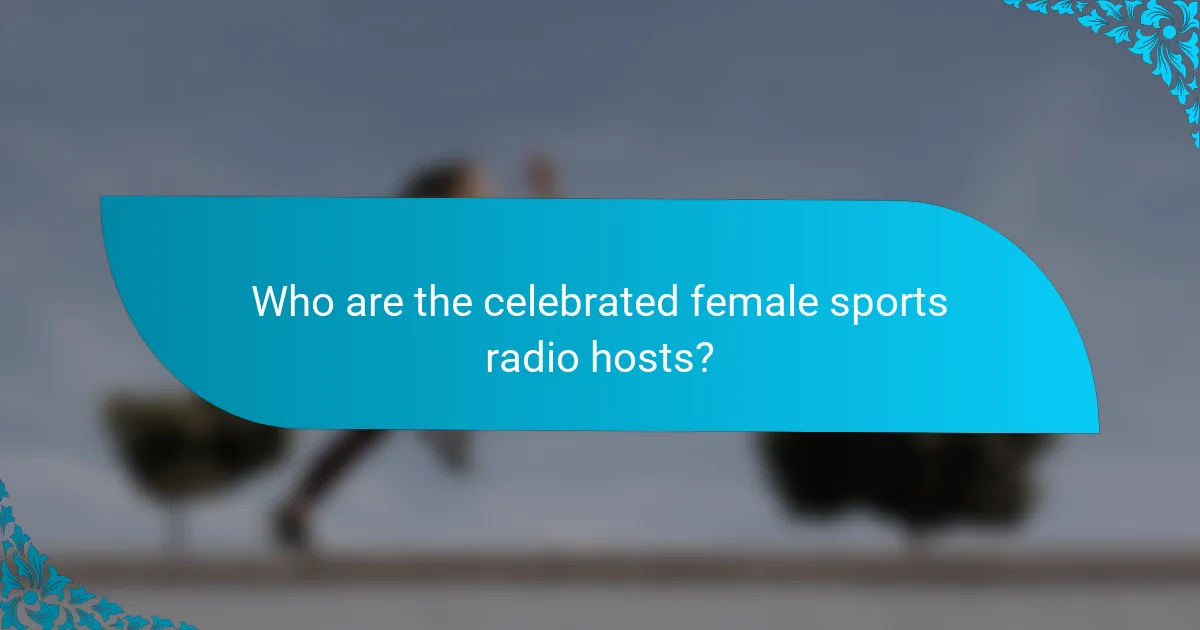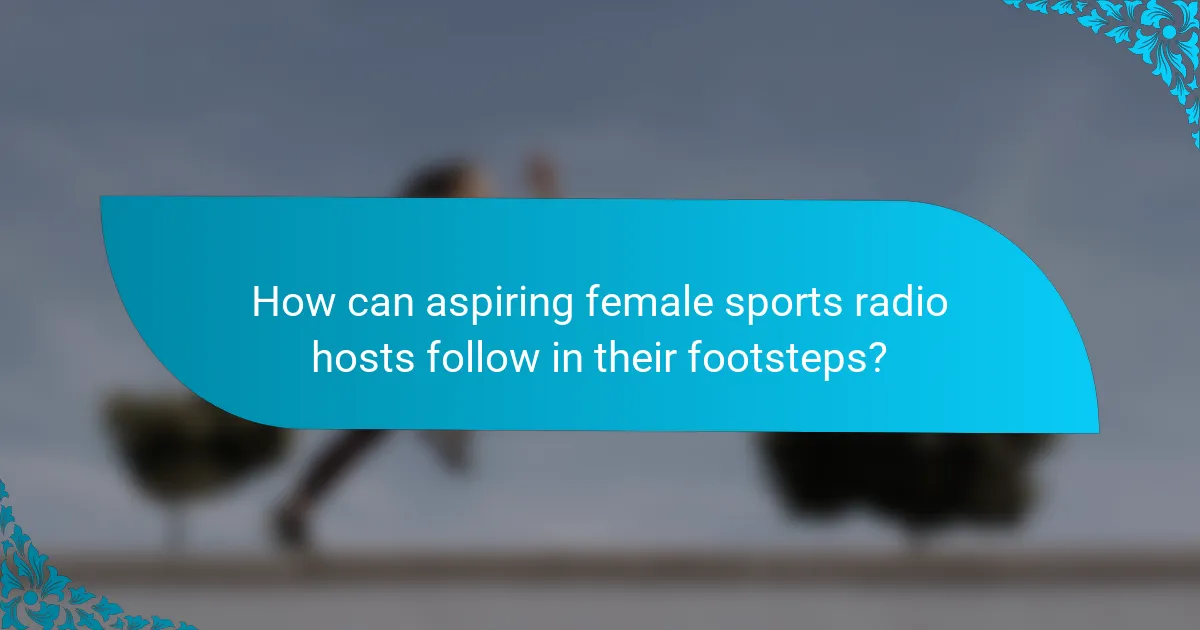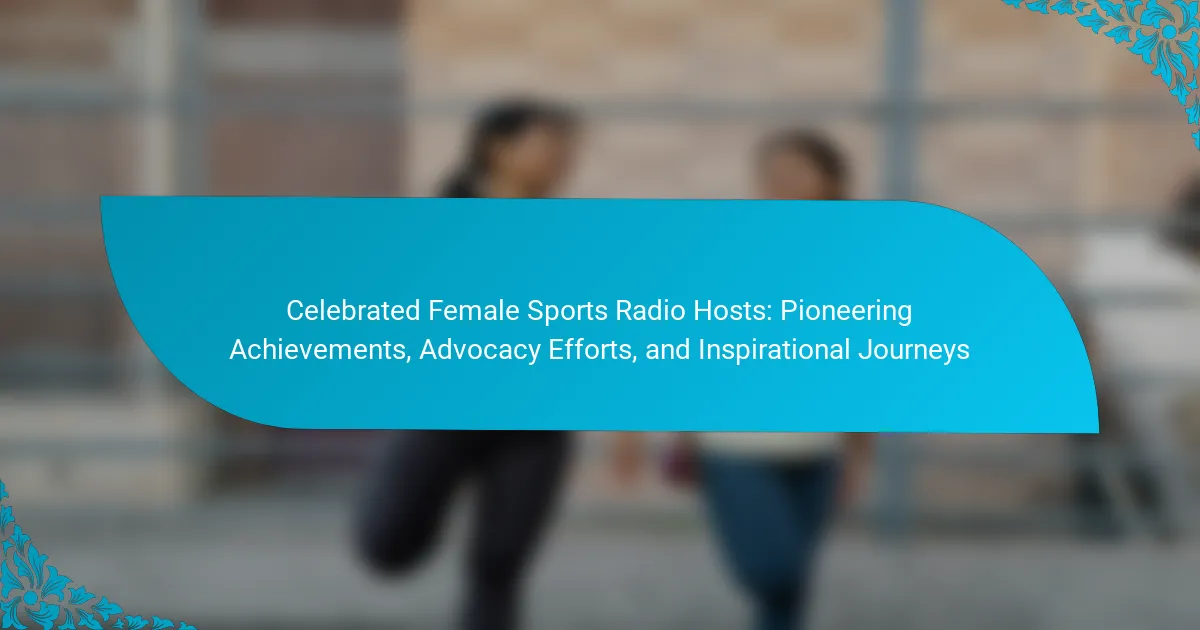The article highlights celebrated female sports radio hosts, including Michelle Beadle, Danette May, and Sarah Spain, who have made significant contributions to sports media. It explores their achievements in breaking barriers and advocating for women’s representation in the industry. The piece also provides guidance for aspiring female sports radio hosts, emphasizing the importance of education, practical experience, and community support. Key strategies for success include pursuing relevant degrees, securing internships, building a personal brand, and participating in local sports discussions. The article underscores the growing presence of women in sports radio and the pathways they can take to achieve their goals.

Who are the celebrated female sports radio hosts?
Some celebrated female sports radio hosts include Michelle Beadle, Danette May, and Sarah Spain. Michelle Beadle is known for her work on ESPN, particularly on “SportsNation.” Danette May has gained recognition for her engaging segments and interviews. Sarah Spain is celebrated for her insightful commentary and hosting on ESPN Radio. These hosts have made significant contributions to sports media, breaking barriers and paving the way for future female broadcasters. Their achievements highlight the growing presence of women in sports radio.
What pioneering achievements have these hosts accomplished?
Celebrated female sports radio hosts have achieved significant milestones in broadcasting. They have broken gender barriers in a male-dominated industry. Many have become the first women to host sports talk shows on major networks. For instance, Michele Tafoya was the first female sideline reporter for NBC’s Sunday Night Football. Additionally, hosts like Linda Cohn have paved the way in sports journalism, becoming a prominent voice on ESPN. These women have also advocated for gender equality in sports media. Their achievements inspire future generations of female broadcasters. They continue to influence the landscape of sports radio through their dedication and passion.
How did these achievements impact the sports radio industry?
Achievements of celebrated female sports radio hosts significantly transformed the sports radio industry. They broke gender barriers and increased female representation in a traditionally male-dominated field. Their success inspired more women to pursue careers in sports broadcasting. This shift led to a broader range of perspectives and topics being discussed on air. Increased audience engagement was noted as diverse voices attracted wider listener demographics. Research shows that shows hosted by women often draw higher listener ratings. Their advocacy efforts also highlighted issues of equality and representation in sports. This created a more inclusive environment within the industry, benefiting both hosts and audiences.
What barriers did these hosts overcome to achieve recognition?
These hosts overcame gender bias and stereotypes in a male-dominated industry. They faced challenges such as limited opportunities and underrepresentation in sports media. Many had to prove their expertise and credibility repeatedly. Some dealt with harassment and discrimination from peers and audiences. They also navigated the struggle for equal pay and recognition. Their persistence led to increased visibility for women in sports broadcasting. Their achievements inspired future generations of female sports journalists. These barriers highlight the resilience and determination of celebrated female sports radio hosts.
What advocacy efforts have these hosts engaged in?
It is not possible to provide a specific answer regarding the advocacy efforts of the hosts mentioned in the topic “Celebrated Female Sports Radio Hosts: Pioneering Achievements, Advocacy Efforts, and Inspirational Journeys” without additional context or specific names of the hosts.
How do these advocacy efforts promote gender equality in sports?
Advocacy efforts promote gender equality in sports by increasing visibility and representation of women athletes. These initiatives challenge stereotypes and encourage female participation at all levels. They provide platforms for women’s voices and stories in sports media. Advocacy campaigns often highlight the achievements of female athletes, inspiring young girls to pursue sports. Research shows that increased media coverage of women in sports correlates with higher participation rates among girls. For example, the Women’s Sports Foundation reports that girls are more likely to play sports when they see female role models. Additionally, advocacy efforts push for equitable funding and resources for women’s sports programs. This leads to improved facilities and opportunities for female athletes. Overall, these efforts create a more inclusive environment in sports, fostering gender equality.
What specific causes are these hosts passionate about?
These hosts are passionate about gender equality in sports. They advocate for equal representation and opportunities for women in athletics. Many focus on promoting mental health awareness among athletes. They also support initiatives for youth sports programs. Environmental sustainability in sports is another cause they champion. Additionally, they raise awareness about social justice issues affecting athletes. Their advocacy extends to health and wellness education for athletes. These causes reflect their commitment to improving the sports landscape for future generations.

What are the inspirational journeys of these hosts?
It is not possible to provide specific inspirational journeys of the hosts without further context or names of the hosts in question. Each host’s journey varies significantly based on their personal experiences and career paths.
How did their backgrounds shape their careers in sports radio?
Their backgrounds significantly influenced their careers in sports radio. Many celebrated female sports radio hosts grew up in sports-centric environments. This exposure fostered a deep understanding of sports culture. Additionally, some had experience in journalism or broadcasting prior to entering sports radio. This provided them with essential skills in communication and storytelling. Personal challenges also shaped their perspectives and advocacy efforts. For instance, overcoming gender biases in their early careers fueled their determination. Their diverse backgrounds enriched their on-air personas and resonated with audiences. This combination of experiences made them relatable and credible voices in sports media.
What challenges did they face early in their careers?
Celebrated female sports radio hosts faced significant challenges early in their careers. They often encountered gender bias in a male-dominated industry. Many struggled to gain credibility and respect from peers and audiences. Limited access to opportunities hindered their professional growth. They also faced skepticism regarding their knowledge of sports. Balancing personal life and career demands proved difficult. Additionally, they dealt with the pressure to conform to traditional gender roles. These challenges shaped their determination and resilience in the industry.
Who were their mentors or influences along the way?
It is not possible to provide a definitive answer regarding the mentors or influences of celebrated female sports radio hosts without specific names or context. Each individual’s journey may involve various mentors or influences, which can differ widely.
What milestones define their careers?
Key milestones that define the careers of celebrated female sports radio hosts include breaking into male-dominated broadcasting roles. For instance, some were the first women to host sports talk shows in major markets. They have received awards for excellence in sports journalism, highlighting their impact in the field. Many have paved the way for future generations by mentoring young female broadcasters. Their advocacy for gender equality in sports media has also been significant. Additionally, they have built large audiences, demonstrating their influence and popularity. Many have published books or articles, further establishing their authority in sports commentary. These milestones illustrate their contributions and the barriers they have overcome in the industry.
How have these milestones changed the perception of female broadcasters?
Milestones have significantly changed the perception of female broadcasters by showcasing their capabilities and contributions. Historically, female broadcasters faced stereotypes and limited opportunities. Achievements such as becoming lead sports anchors or hosting major sports events have challenged these stereotypes. For example, figures like Erin Andrews and Hannah Storm have gained respect in a male-dominated industry. Their success has led to increased visibility for women in broadcasting. This visibility encourages younger women to pursue careers in sports media. Moreover, these milestones have sparked conversations about gender equality in the industry. Statistics show a rise in female representation in sports broadcasting roles over the past decade. This shift reflects a broader acceptance of women as authoritative voices in sports.
What unique contributions have they made to sports journalism?
Celebrated female sports radio hosts have made unique contributions to sports journalism by breaking gender barriers in a male-dominated field. They have pioneered the inclusion of diverse perspectives in sports discussions. For instance, hosts like Michelle Beadle and Jemele Hill have brought attention to social issues through sports commentary. Their advocacy for equality and representation has reshaped industry standards. They have also created platforms for underrepresented voices in sports media. Their influence has led to increased visibility for women’s sports and female athletes. Additionally, they have inspired a new generation of female journalists. Their contributions have transformed the landscape of sports journalism, making it more inclusive and socially aware.

How can aspiring female sports radio hosts follow in their footsteps?
Aspiring female sports radio hosts can follow in the footsteps of celebrated figures by gaining relevant education and experience. Pursuing a degree in communications or journalism is beneficial. Internships at radio stations provide practical skills and networking opportunities. Building a personal brand through social media helps in gaining visibility. Listening to established hosts offers insights into successful techniques. Participating in local sports discussions can enhance confidence and knowledge. Joining organizations that support women in sports media fosters community and mentorship. These steps align with the paths taken by pioneers in the field.
What skills are essential for success in sports radio?
Successful sports radio hosts need strong communication skills. They must articulate thoughts clearly and engage listeners effectively. Knowledge of sports is crucial. Hosts should understand the rules, history, and current events in various sports. Analytical skills are also important. They need to analyze games and player performances to provide insightful commentary.
Additionally, adaptability is vital. Hosts must adjust to live situations and unexpected changes during broadcasts. Networking skills play a role in building relationships with athletes, coaches, and industry professionals. Finally, passion for sports drives hosts to produce engaging and authentic content. These skills collectively contribute to success in the competitive field of sports radio.
How can one develop a unique voice in the industry?
To develop a unique voice in the industry, individuals should focus on authenticity and personal experiences. Embracing one’s unique background and perspective can differentiate a voice. Consistent engagement with the audience fosters connection and loyalty. Tailoring content to reflect personal insights creates relatability. Studying successful figures in the industry provides valuable lessons. Analyzing their styles can inspire one’s approach. Regular practice in communication enhances confidence and clarity. Feedback from peers and listeners can refine one’s voice further. These strategies contribute to establishing a distinctive presence in the industry.
What networking strategies are effective for newcomers?
Effective networking strategies for newcomers include attending industry events and joining professional organizations. Engaging in social media platforms relevant to the industry can also enhance visibility. Building relationships with mentors provides guidance and valuable connections. Actively participating in discussions and forums helps newcomers establish credibility. Volunteering for projects or events creates opportunities for collaboration. Following up with contacts after initial meetings fosters lasting relationships. Research shows that 70% of jobs are found through networking, highlighting its importance. Networking is essential for career growth and building a professional support system.
What resources are available for aspiring hosts?
Aspiring hosts can access various resources to enhance their skills and knowledge. Online courses provide training in broadcasting, public speaking, and sports commentary. Books on media and communication offer insights into effective hosting techniques. Networking events allow aspiring hosts to connect with industry professionals. Podcasts featuring successful hosts share valuable experiences and advice. Online forums and social media groups provide community support and discussion opportunities. Additionally, mentorship programs pair aspiring hosts with experienced professionals for guidance. These resources collectively support the development of aspiring hosts in the competitive landscape of sports radio.
Which organizations support women in sports broadcasting?
Organizations that support women in sports broadcasting include the Women’s Sports Foundation and the Association for Women in Sports Media. The Women’s Sports Foundation advocates for gender equality in sports and provides resources for female athletes and broadcasters. The Association for Women in Sports Media offers networking opportunities and professional development for women in the field. These organizations work to empower women and promote their visibility in sports media.
What educational programs or workshops should they consider?
They should consider programs focused on sports journalism and broadcasting. Workshops on public speaking and communication skills are also beneficial. Leadership training programs can enhance their advocacy efforts. Networking events in the sports media industry provide valuable connections. Courses on digital media and social media strategies are essential for modern broadcasting. These educational opportunities empower female sports radio hosts to excel in their careers.
What tips can help aspiring hosts thrive in the industry?
Aspiring hosts can thrive in the industry by honing their communication skills. Effective communication is crucial for engaging audiences. They should also develop a strong personal brand. A unique brand helps in standing out in a competitive market. Networking is essential for building relationships within the industry. Engaging with peers and mentors can provide valuable insights. Additionally, staying informed about current sports events is vital. Knowledge of the latest news enhances credibility with listeners. Consistency in content delivery builds trust with the audience. Regularly producing quality content keeps listeners engaged and coming back. Lastly, embracing feedback allows hosts to improve and adapt their style. Constructive criticism can lead to significant growth in hosting abilities.
The main entity of the article is celebrated female sports radio hosts, who have made significant contributions to the sports media industry. The article outlines their pioneering achievements, such as breaking gender barriers and advocating for gender equality, while highlighting their unique journeys and the challenges they faced. It also discusses the impact of their advocacy efforts on promoting female representation in sports, the skills necessary for success in sports radio, and resources available for aspiring hosts. Ultimately, the article emphasizes how these hosts have reshaped perceptions of women in broadcasting and inspired future generations.
